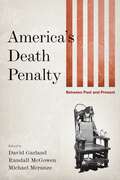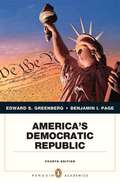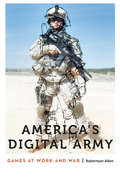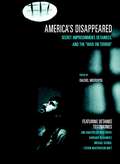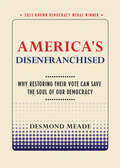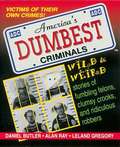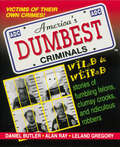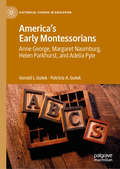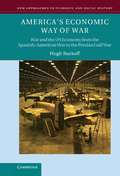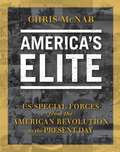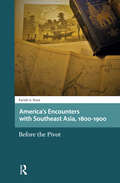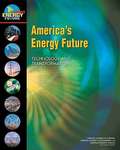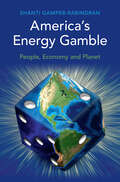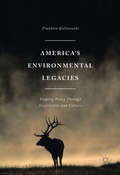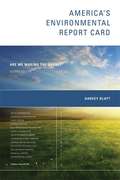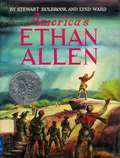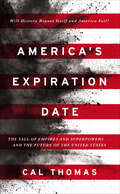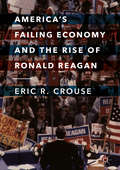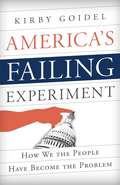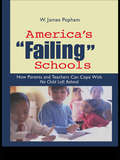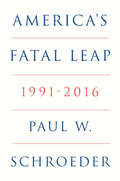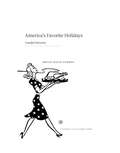- Table View
- List View
America's Death Penalty: Between Past and Present
by David Garland Michael Meranze Randall McGowenOver the past three decades, the United States has embraced the death penalty with tenacious enthusiasm. While most of those countries whose legal systems and cultures are normally compared to the United States have abolished capital punishment, the United States continues to employ this ultimate tool of punishment. The death penalty has achieved an unparalleled prominence in our public life and left an indelible imprint on our politics and culture. It has also provoked intense scholarly debate, much of it devoted to explaining the roots of American exceptionalism.America’s Death Penalty takes a different approach to the issue by examining the historical and theoretical assumptions that have underpinned the discussion of capital punishment in the United States today. At various times the death penalty has been portrayed as an anachronism, an inheritance, or an innovation, with little reflection on the consequences that flow from the choice of words. This volume represents an effort to restore the sense of capital punishment as a question caught up in history. Edited by leading scholars of crime and justice, these original essays pursue different strategies for unsettling the usual terms of the debate. In particular, the authors use comparative and historical investigations of both Europe and America in order to cast fresh light on familiar questions about the meaning of capital punishment. This volume is essential reading for understanding the death penalty in America.Contributors: David Garland, Douglas Hay, Randall McGowen, Michael Meranze, Rebecca McLennan, and Jonathan Simon.
America's Democratic Republic (Fourth Edition)
by Edward S. Greenberg Benjamin I. PageUpdated in a new 4th edition, America's Democratic Republic is a brief, affordable book in an accessible trade-like format that explores the clash between the democratic aspirations of the American people and the republican foundations of our Constitution. Written with a lively, narrative style, this text traces the storyline of American government and focuses on the long standing and inescapable tension between the country's 18th century republican Constitutional foundations and the democratic aspirations of the American people.
America's Digital Army: Games at Work and War (Anthropology of Contemporary North America)
by Robertson AllenAmerica’s Digital Army is an ethnographic study of the link between interactive entertainment and military power, drawing on Robertson Allen’s fieldwork observing video game developers, military strategists, U.S. Army marketing agencies, and an array of defense contracting companies that worked to produce the official U.S. Army video game, America’s Army. Allen uncovers the methods by which gaming technologies such as America’s Army, with military funding and themes, engage in a militarization of American society that constructs everyone, even nonplayers of games, as virtual soldiers available for deployment.America’s Digital Army examines the army’s desire for “talented” soldiers capable of high-tech work; beliefs about America’s enemies as reflected in the game’s virtual combatants; tensions over best practices in military recruiting; and the sometimes overlapping cultures of gamers, game developers, and soldiers. Allen reveals how binary categorizations such as soldier versus civilian, war versus game, work versus play, and virtual versus real become blurred—if not broken down entirely—through games and interactive media that reflect the U.S. military’s ludic imagination of future wars, enemies, and soldiers.
America's Dirty Wars
by Russell CrandallThis book examines the long, complex experience of American involvement in irregular warfare. It begins with the American Revolution in 1776 and chronicles big and small irregular wars for the next two and a half centuries. Examples taken from the American experience reveal that fighting - and, more so, winning - all types of wars is extraordinarily complex, frustrating, controversial and bloody. What is readily apparent in dirty wars is that failure is painfully tangible while success is often amorphous. Successfully fighting these wars often entails striking a critical balance between military victory and politics. America's status as a democracy only serves to make fighting - and, to a greater degree, winning - these irregular wars even harder. Rather than futilely insisting that Americans should not or cannot fight this kind of irregular war, Russell Crandall argues that we would be better served by considering how we can do so as cleanly and successfully as possible.
America's Disappeared: Secret Imprisonment, Detainees, and the War on Terror (Open Media Series)
by Barbara Olshansky Steven Macpherson Watt Reed Brody Rachel Meeropol Michael RatnerThe confirmation proceedings for Alberto R. Gonzales and Condeleezza Rice, like the Abu Ghraib prison scandal, triggered a national debate about the U.S. government's controversial treatment of detainees and its practice of torture. At the heart of the debate is the question: Is the United States undermining democracy, freedom, and human rights in it's effort to protect its citizens from terrorism? The authors of AMERICA'S DISAPPEARED answer, yes.AMERICA'S DISAPPEARED describes how the U.S. government, in response to the events of 9/11, launched an unprecedented campaign of racial profiling, detentions, and deportations so grievous as to evoke the internment of Japanese Americans during World War II. It brings together, for the first time, detainees' own testimonies along with analysis by the leading constitutional attorneys and human rights advocates. In addition to a detailed exploration of detention--the forms currently in use, and the conditions of each--the book challenges the Bush administration's justifications for violating the Geneva Conventions and the most basic definitions of human rights.
America's Disenfranchised: Why Restoring Their Vote Can Save the Soul of Our Democracy (Brown Democracy Medal)
by Desmond MeadeThe Lawrence and Lynne Brown Democracy Medal, presented by the McCourtney Institute for Democracy at Penn State, recognizes outstanding individuals, groups, and organizations that produce innovations to further democracy in the United States or around the world. Voting is foundational in a democracy, yet over six million American citizens remain stripped of their ability to participate in elections. Once convicted of a felony, people who complete their sentences reenter society, but no longer with the civil rights they once had. They may return to school, secure employment to provide for their families, and become law-abiding, tax-paying citizens—sometimes for decades—and still be denied the voting rights afforded to every other citizen.Desmond Meade, director of the Florida Rights Restoration Coalition and a returning citizen himself, played an instrumental role in the landslide 2018 Amendment 4 victory in Florida, which used the ballot box to restore voting rights to 1.4 million Floridians with a previous felony conviction. Meade argues how, state by state, America can do better. His efforts in Florida present a compelling argument that creating access to democracy for those living on the fringes of society will create a more vibrant and robust democracy for all. He is the winner of the 2021 Brown Democracy Medal for his continuing work to restore voting rights and connect Americans along shared social values.
America's Dumbest Criminals
by Daniel Butler Leland Gregory Alan RayBASED ON TRUE STORIES FROM LAW ENFORCEMENT OFFICIALS ACROSS THE COUNTRY
America's Dumbest Criminals: Wild & Weird Stories of Fumbling Felons, Clumsy Crooks, and Ridiculous Robbers
by Daniel Butler Leland Gregory Alan Ray100 crazy stories of America's dumbest criminals. WARNING: The crimes you are about to read are true. The names have been changed . . . to protect the ignorant.Here is the ultimate collection of the most incredibly stupid and painfully dumb attempts at crime ever brought together.The woman who invalidated her winning $5,000 lottery ticket by altering it to match the $20 prize numberThe accused vending-machine thief who paid his $400 bail entirely in quartersThe streaking robber who thought clothes would make him more identifiableThe convenience store thief who got away with just a hotdog, only to end up in the parking lot choking on the wiener
America's Early Montessorians: Anne George, Margaret Naumburg, Helen Parkhurst and Adelia Pyle (Historical Studies in Education)
by Gerald L. Gutek Patricia A. GutekThis book traces the early history of the Montessori movement in the United States through the lives and careers of four key American women: Anne George, Margaret Naumburg, Helen Parkhurst, and Adelia Pyle. Caught up in the Montessori craze sweeping the United States in the Progressive era, each played a significant role in the initial transference of Montessori education to America and its implementation from 1910 to 1920. Despite the continuing international recognition of Maria Montessori and the presence of Montessori schools world-wide, Montessori receives only cursory mention in the history of education, especially by recognized historians in the field and in courses in professional education and teacher preparation. The authors, in seeking to fill this historical void, integrate institutional history with analysis of the interplay and tensions between these four women to tell this educational story in an interesting—and often dramatic—way.
America's Economic Way of War: War and the US Economy from the Spanish-American War to the First Gulf War
by Hugh RockoffHow did economic and financial factors determine how America waged war in the twentieth century? This important new book exposes the influence of economics and finance on the questions of whether the nation should go to war, how wars would be fought, how resources would be mobilized, and the long-term consequences for the American economy. Ranging from the Spanish-American War to the Gulf War, Hugh Rockoff explores the ways in which war can provide unique opportunities for understanding the basic principles of economics as wars produce immense changes in monetary and fiscal policy and so provide a wealth of information about how these policies actually work. He shows that wars have been more costly to the United States than most Americans realize as a substantial reliance on borrowing from the public, money creation and other strategies to finance America's war efforts have hidden the true cost of war.
America's Economic Way of War: War and the US Economy from the Spanish-American War to the Persian Gulf War
by Hugh RockoffHow did economic and financial factors determine how America waged war in the twentieth century? This important new book exposes the influence of economics and finance on the questions of whether the nation should go to war, how wars would be fought, how resources would be mobilized, and the long-term consequences for the American economy. Ranging from the Spanish-American War to the Gulf War, Hugh Rockoff explores the ways in which war can provide unique opportunities for understanding the basic principles of economics as wars produce immense changes in monetary and fiscal policy and so provide a wealth of information about how these policies actually work. He shows that wars have been more costly to the United States than most Americans realize as a substantial reliance on borrowing from the public, money creation and other strategies to finance America's war efforts have hidden the true cost of war.
America's Elite: US Special Forces from the American Revolution to the Present Day
by Chris McnabFrom Roger's Rangers to the Revolution, Civil War, World War I & II, Korea, Vietnam, Iraq, Afghanistan, and the Bin Laden raid, this book covers over 250 years of American Special Forces action. America's Elite takes the reader through some of the most dramatic special forces operations in US history, from sniping British commanders during the Revolutionary War to Riverine incursions in the Mekong Delta in Vietnam, and from demolition missions on D-Day to the SEAL assault on Osama bin Laden's compound in 2011. Training and selection procedures are explained in detail, and the book also describes some of the technologies that have separated regular soldiers from their Special Forces counterparts. Illustrated throughout with striking photography and artworks, America's Elite forms the most comprehensive and visually impressive single-volume guide to US Special Forces available.
America's Encounters with Southeast Asia, 1800-1900: Before the Pivot (Asian History)
by Farish A. NoorA century before the Philippines came under American control, Americans were already travelling to Southeast Asia regularly. This book looks at the writings of American diplomats, adventurers, and scientists and chronicles how nineteenth-century Americans viewed and imagined Southeast Asia through their own cultural-political lenses. It argues that as Americans came to visit the region they also brought with them a train of cultural assumptions and biases that contributed to the development of American Orientalism in Southeast Asia.
America's Energy Future: Technology and Transformation
by National Academy of Science National Academy of Enegineering National Research Council of the National AcademiesEnergy touches our lives in countless ways and its costs are felt when we fill up at the gas pump, pay our home heating bills, and keep businesses both large and small running. There are long-term costs as well: to the environment, as natural resources are depleted and pollution contributes to global climate change, and to national security and independence, as many of the world's current energy sources are increasingly concentrated in geopolitically unstable regions. The country's challenge is to develop an energy portfolio that addresses these concerns while still providing sufficient, affordable energy reserves for the nation. The United States has enormous resources to put behind solutions to this energy challenge; the dilemma is to identify which solutions are the right ones. Before deciding which energy technologies to develop, and on what timeline, we need to understand them better. America's Energy Future analyzes the potential of a wide range of technologies for generation, distribution, and conservation of energy. This book considers technologies to increase energy efficiency, coal-fired power generation, nuclear power, renewable energy, oil and natural gas, and alternative transportation fuels. It offers a detailed assessment of the associated impacts and projected costs of implementing each technology and categorizes them into three time frames for implementation.
America's Energy Gamble: People, Economy and Planet
by Shanti Gamper-RabindranHow can America get back to an energy transition that's good for the economy and the environment? That's the question at the heart of this eye-opening and richly informative dissection of the Trump administration's energy policy. The policy was ardently pro-fossil fuel and ferociously anti-regulation, implemented by manipulating science and economic analysis, putting oil and gas insiders at the helm of environmental agencies, and hacking away at democratic norms that once enjoyed bipartisan support. The impacts on the nation's health, economy, and environment were - as this book carefully demonstrates - dire. But the damage can be reversed. Ordinary Americans, civil society groups, environmental professionals, and politicians at every level all have parts to play in making sure the needed energy transition leaves no one behind. This compelling book will appeal to course instructors and students, government and industry officials, activists and journalists, and everyone concerned about the nation's future.
America's Environmental Legacies: Shaping Policy through Institutions and Culture
by Franklin KalinowskiThis powerful book focuses on the capacity of the American political system to respond to ecological challenges through policy perspectives, the constraints of our written Constitution, and the determination we muster to address these tests of national character. Put simply, this is a book about politics, policy, and political will. Kalinowski brilliantly shows that America's collective will is founded in the cultural values enunciated by the Founding Fathers, passed down through history with modifications, and comprises the essential missing ingredient in determining how we currently respond to crises. Thomas Jefferson, Alexander Hamilton, and James Madison had distinct ideas concerning the role that Nature might play in the future. Recognizing the origins and impacts of their environmental legacies is the key to interpreting where American environmental politics is today, how we got here, and where we might be headed.
America's Environmental Report Card
by Harvey BlattA timely survey of the state of America's environment: how we can take action to achieve a sustainable future.
America's Ethan Allen
by Stewart H. HolbrookThis book presents the life and legends of Colonel Ethan Allen and Green Mountain boys of the American Revolution.
America's Expiration Date: The Fall of Empires and Superpowers . . . and the Future of the United States
by Cal ThomasA warning and a wake-up call to learn history so we are not doomed to repeat it. A must-read for anyone who longs for a promising future for our great nation.What is wrong with America today? Is it possible that America could crumble and our democracy fail?Questions like these plague Americans and cause us to be anxious about the future of the "land that we love." Individuals may come to different conclusions, but there seems to be a common thread - the deep-seated feeling that we need to improve our country. Our culture is increasingly immoral, the family structure is threatened from all sides, and government programs consistently overreach, creating massive debt.In this powerful and prophetic book, nationally syndicated columnist and trusted political commentator Cal Thomas offers a diagnosis of what exactly is wrong with the United States by drawing parallels to once-great empires and nations that declined into oblivion. Citing the historically proven 250-year pattern of how superpowers rise and fall, he predicts that America's expiration date is just around the corner and shows us how to escape their fate.Through biblical insights and hard-hitting truth, he reminds us that real change comes when America looks to God instead of Washington. Scripture, rather than politics, is the GPS he uses to point readers to the right road - a road of hope, life, and change. Because, he says, if we're willing to seek God first, learn from history, and make changes at the individual and community level, we can not only survive, but thrive, again.This powerful, timely, and much-needed perspective is a must-read for anyone who longs for a promising future for our great nation.
America's Failing Economy and the Rise of Ronald Reagan
by Eric R. CrouseThis book examines one of the most important economic outcomes in American history—the breakdown of the Keynesian Revolution. Drawing on economic literature, the memoirs of economists and politicians, and the popular press, Eric Crouse examines how economic decline in the 1970s precipitated a political revolution. Keynesian thought flourished through the presidencies of Lyndon B. Johnson, Richard Nixon, and Gerald Ford, until stagflation devastated American workers and Jimmy Carter’s economic policies faltered, setting the stage for the 1980 presidential campaign. Tracking years of shifting public opinion and colorful debate between free-market and Keynesian economists, this book illuminates a neglected era of American economic history and shows how Ronald Reagan harnessed a vision of small government and personal freedom that transformed the American political landscape.
America's Failing Experiment: How We The People Have Become The Problem
by Kirby GoidelWritten in a provocative, jargon-free style ideal for stimulating classroom discussion, America's Failing Experiment directly challenges would-be reformers who believe the solution to our current political paralysis is more democracy. Kirby Goidel finds that the fault for our contemporary political dysfunction resides not with our elected officials but with our democratic citizenries. He argues that our elected officials are overly responsive to public opinion which is often poorly informed, incoherent, and uncertain. The result is a more polarized political system, rising inequality, and institutional gridlock. Though not new, these concerns take on deeper political significance in a digital age where information flows more quickly and opportunities for feedback are virtually unlimited. If the diagnosis is too much democracy, the counterintuitive solution runs against our cultural norms—less citizen involvement, greater discretion for political elites, and greater collective responsibility.
America's Failing Schools: How Parents and Teachers Can Cope With No Child Left Behind
by W. James PophamIn America's "Failing" Schools, W. James Popham provides parents and teachers explanations of No Child Left Behind as a whole, walking them through the implications for standardized testing in particular, in language that is uncomplicated and straightforward. Popham offers definitions of the law and its key terms, explanations of what it really means when a school is labeled "failing," and concrete suggestions for what can be done in response.
America's Fatal Leap: 1991-2016
by Paul W. SchroederA decisive analytic critique of US foreign policy by one of America&’s greatest historiansAmerica's Fatal Leap deconstructs US geopolitics after the end of the Cold War, informed by its author's unsurpassed command of modern history. Paul W. Schroeder, an acclaimed historian of international diplomacy, was a conservative and a natural supporter of American leadership in the world.But he wrote scathing op-eds for the National Interest and the American Conservative about the hubris and moral failings of the War on Terror, warning of damaging long-range effects on the international system. Schroeder compared 9/11 to the assassination in Sarajevo that sparked the First World War, insisting that a great power should never give terrorists a war they wanted.He wrote with extraordinary prescience - months before the US launched its attack on the Taliban - of the 'risks of victory' in Afghanistan, characterised the war in Iraq as a failed bid for informal empire, and called for 'disimperialism' in the Middle East.America's Fatal Leap collects Schroeder's remarkable interventions on America's adventurism in the Middle East, from the 1991 Gulf War to the Surge of 2007. It includes an Introduction by Perry Anderson, author of US Foreign Policy and Its Thinkers and Ever Closer Union?
America's Favorite Holidays
by Bruce David ForbesAmerica's Favorite Holidays explores how five of America's culturally important holidays--Christmas, Valentine's Day, Easter, Halloween, and Thanksgiving--came to be what they are today, seasonal and religious celebrations heavily influenced by modern popular culture. Deftly distilling information from a wide range of sources, Bruce David Forbes reveals often-surprising answers to questions about each holiday's traditions. Was Christmas always as commercialized as it is today? Is Thanksgiving a religious or secular holiday? When did we begin trick-or-treating on Halloween? Appealing and insightful, America's Favorite Holidays satisfies our curiosity about the origins of our holidays and the fascinating ways in which religion and culture mix.
America's Favorite Radio Station: WKRP in Cincinnati
by Michael B. KasselAlthough it became one of the most successful programs in syndicated television history, WKRP in Cincinnati faced an uphill struggle trying to obtain prime-time success. Kassel chronicles the decisions and problems that affected WKRP's primetime success, and explores the reasons why it went on to become a classic.
